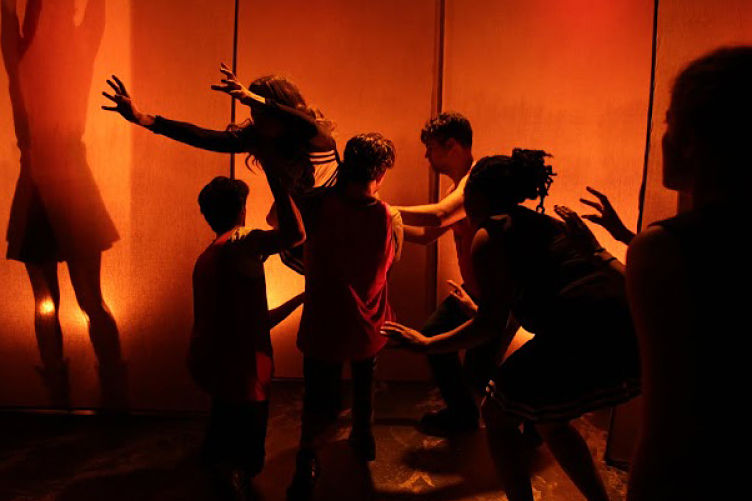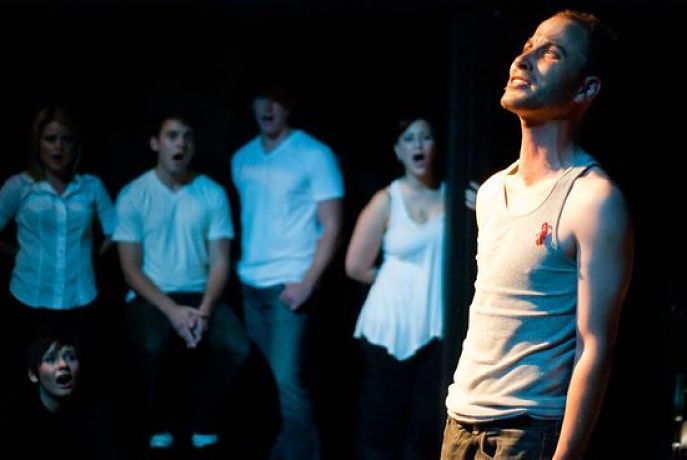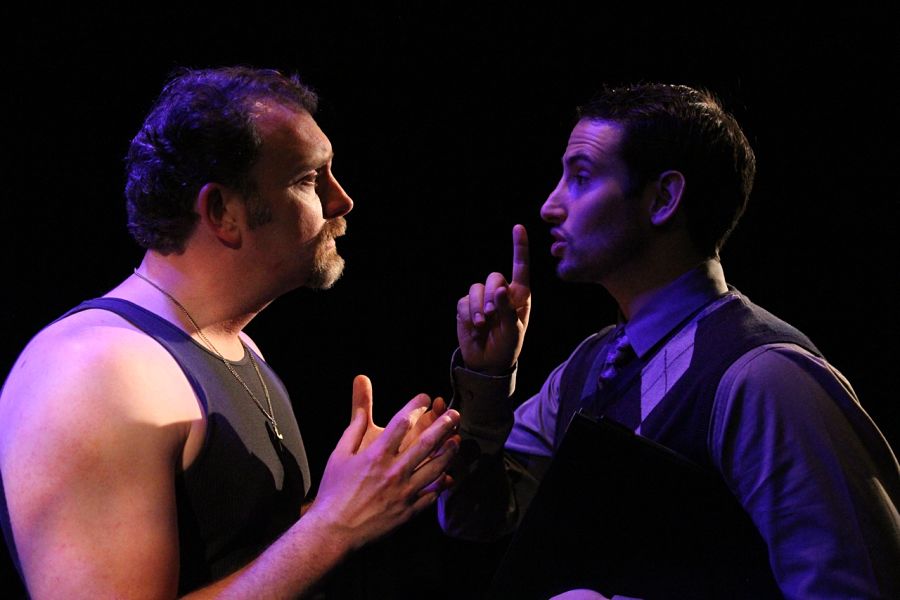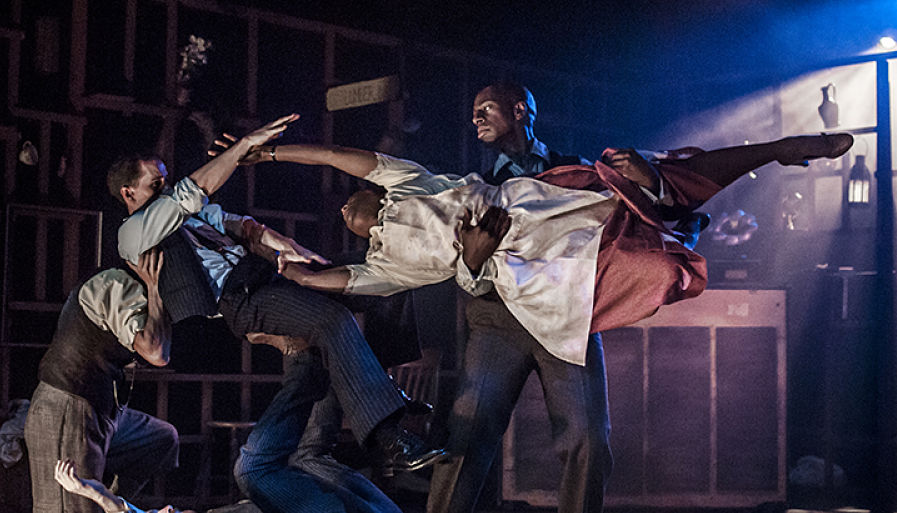Some years back, an actor I know was offered parts in two conflicting Los Angeles stage productions. One was a classical piece with an excellent director, coproduced by companies with a combined 50 years’ track record. The other was a musical at the young Coeurage Theatre Company, a band of twenty- and thirtysomethings who had amassed a few seasons of strong, mostly contemporary shows. The actor decided to go with the upstart.
Fairly soon he regretted his decision; he was pretty sure his director had never directed before. Weeks of rehearsal did not improve the actor’s outlook. A bright spot came when the classical show he had declined announced that it would not go up after all. Bullet dodged. But the show he was in—well…
Coeurage’s artistic director was having a similar reaction. Ten days from opening, Jeremy Lelliott watched a run-through and asked the creative team if he should pull the plug. But in an unforced error turned serendipitous, Lelliott had allowed the show’s director to schedule around a gig that took him out of town during tech. A new director was brought in with a week to fix the show. The musical, which shall remain nameless to protect the innocent as well as the guilty, became the hit of that Coeurage season.

This manner of making theatre is a nightmare, and by almost every measure it’s atypical of the Coeurage experience. But, Lelliott says, “In some ways that’s the show I’m most proud of. We’re stronger because of it. We learn from our mistakes.” Thanks to that nail-biter, it’s now company policy that anybody who wants to direct for Coeurage must learn to direct somewhere else first. And while the company hasn’t always made the right call the first time, Lelliott says, “We refuse to go down in flames. But we’ve come close more recently than you’d think.”
Founded in 2009 by MFA and BFA graduates of California State University–Fullerton, Coeurage has weathered many of the struggles that typically kill companies started by friends right out of college: artistic disappointment, predatory landlords, in-company romance. But 2015’s sixth season was the company’s most successful yet, winning a host of local awards, setting attendance records, and securing the nonprofit collective its first significant unearned income. Microscopic by commercial standards and without a permanent home, Coeurage is actually more solvent—and hence better poised to spend the next six years pushing the theatrical envelope—than many local outfits with 10 times its history, roster, and rent.
Company members say they owe it all to poverty. When I say I think their edge is in excellence of execution—that there are many similarly poor, well-intentioned theatres but few with their consistent artistic achievements—they concede that they take special pride in programming and performance. As development director Mark Jacobson puts it, “We’ll never put on a show that we don’t think is worth the ticket price at any theatre in town.” Still, the company unanimously insists that keeping budgets small is what makes the excellence possible.
Shows are funded almost entirely from previous ticket sales, and tend to earn roughly the same amount they cost to put up: an average of about $7,000, including rent and Actors’ Equity stipends. (The stipends are no longer required of Los Angeles membership companies under what Equity calls its Transitional 99-Seat Code, currently under negotiation with L.A.’s Review Committee, but Coeurage still pays them.) The membership, limited to 30 at a time, with a turnover of roughly 2 per year, pays no dues. The staff works without pay.
“The Coeurage system guarantees we’re not going to make money, no matter what,” jokes associate artistic director Joseph V. Calarco. It’s true that the company would probably have to own a space in order to earn anything. But this separation from the profit motive may serve to keep the art precious; as resident music director Gregory Nabours says, “You can’t always love theatre if it’s your source of income.”
Calarco does admit, though, that at the first production meeting for his third directorial effort, 2015’s The Sparrow, he was embarrassed to show his designers their budgets. On the other hand, the upside “of having good artists work with nothing is that it forces them to take advantage of the medium.” The Sparrow was a critical triumph and sold out three-quarters of its performances. But it wasn’t easy. “It’s like artistic bench-pressing,” he says. “You can’t be lazy.” Lelliott has acted, directed, and produced for his company, and calls putting up a show at Coeurage “a suicide mission every time.”

This may be the reason Coeurage is among the most theatrical of the many theatre companies in Los Angeles, a city whose stages feature an inordinate amount of the realism more common (and often more appropriate) to television and film. Calarco cut some of his artistic teeth in Chicago, and he makes an interesting distinction: “Most of the time in Chicago when a show isn’t effective, it’s trying to do something interesting. Bad shows in L.A. are not only bad—they’re usually not trying to exercise the medium.”
Also an actor and sound designer, Calarco will sometimes work with the author of a published script to tailor a production to his director’s eye. “When we can’t afford stuff,” he says of Coeurage, “we have to think of ways to make the audience think there’s stuff there.”
The buck stops—the spending, anyway—with managing director Nicole Monet. The company wouldn’t exist without her, Lelliott avers. For her part, she says that the key to her position is saying no. She recalls that the production team for last year’s Failure: A Love Story originally submitted an $18,000 budget, including items that were marked as non-negotiable. Monet’s response: “Everything is negotiable.”
Michael Matthews, Failure‘s director, was a guest artist used to overseeing budgets many times that size. But he was able to conform to the practical necessities, bringing in the show at about half the first proposed budget, and went on to win an Ovation Award for Best Direction of a Play. Matthews says the experience took him back to his storefront theatre days: “The constraints made me work harder but clarified my vision. I opted to use my ensemble. I could not have been happier. I never wanted to leave rehearsal.”
At the core of the company’s economically barebones ethic is its Pay What You Want model, a system guaranteed to alarm accountants. Distinct from the guilt-oriented Pay What You Can paradigm, the concept of PWYW was a concept raised at the first meetings of the founding membership. Most who were there characterize the notion of letting patrons decide how much they’d like to pay as a move toward greater accessibility. “We’re a young company,” says Monet. “We’re doing shows for people our age who are poor, who want to see something awesome.”
Lelliott remembers other motivations too—such as the entirely reasonable worry that their initial offerings might not be worth charging for. Of course, alongside this was a marketing angle. “If you say, ‘Hey, we just finished college and we’re doing a LaBute play for $8 a ticket,’ you’re not raising any credit with the public.”
While many theatres have adopted Pay What You Can nights, very few are committed to selling every seat at a value the audience may decide. A few have tried in England; one or two in Chicago and Dallas. But it’s a concept to which Coeurage has stuck fiercely for going on seven years. The box office once exchanged a ticket for a fig. But when he’s asked about the presumptive unsustainability of this utopian-sounding idea, marketing director Ryan Wagner sighs; he’s evidently been asked this question, a lot.
“Yes,” he concedes, “years ago, a woman gave us a fig. But she’d come and paid previously, multiple times.” Wagner points out that the average ticket price increased quickly from around $8 the first season to $15 over the past five shows. “The model has been perceived as a symbolic gesture, in that we’re ready to expose our revenue stream to abuse—and that just hasn’t happened. The gesture has been appreciated. I don’t know the behavioral economics behind it, but people respond.”
Also the company’s graphic designer, Wagner holds an MBA and does not appreciate my description of his job as “selling free seats.” But conventional marketing, he says, largely does not apply to the arts. “In theatre, the show matters more than the company. You sell the show. Lots of prestigious theatres routinely put out poor work, so there’s no correlation between company and quality.”
Jacobson concurs. “People in town are not just aware of us; they know what show we’re doing. The fact that people are willing to increase the amount they pay, no matter the economic situation, suggests that this is the right model for us.”

They’re especially sure because they’ve learned it the hard way; in their fourth season, they tried spending lots of money and it didn’t work out. Indeed, a nadir of company confidence occurred after Coeurage crowdsourced $20,000 to remount The Trouble With Words, an original musical they’d done two seasons before as a low-tech, high-energy piece. In the process, they realized that additional money wasn’t improving the show. Some members started to resent the elaborate set that took weeks to build, and the feeling spread that the piece’s ambition wasn’t worth its consumption of emotional and physical resources. Says Wagner, “The remount became a giant symbol of spending all this money, being up till 3 in the morning making it —because we’re the labor—and nobody gives a damn.”
Nabours, the author of that show as well as Wagner’s fiance, agrees about the unhappy relationship between exorbitance and creativity. “Money affects everything,” he says. So does a lack of it, which “plays a lot into why people like us,” he says. “We have a natural nostalgia for play: When you’re a kid, a stick is a wand. We let the audience fill in the holes.”
That same season, morale dropped for other reasons as well. The company lost its lease at a Hollywood venue just as membership was on the verge of production-fatigue burnout. Lelliott considered stepping down, but staff convinced him that the company would fold if he did, so he stayed.
A reorganization took place. Leadership realized that the company had to align its free-spirited social conscience with a methodical operations plan that reflected a learning curve over the first four years. Some members who had been drawn elsewhere were replaced by new blood. Company manager Sammi Smith structured meetings more stringently. “I started having people send me agenda items a few days before the meetings,” Smith says. This may sound elementary, but as members got into their late 20s and early 30s, the idea was to “put that maturity into what we were doing. Our demeanor, the way we handle conflicts, the way we structure rehearsals, making sure people are taken care of—we had the ability to make this an actual business.”
It worked. The following two seasons saw a leaner, more disciplined company, with more personality-specific responsibilities. “When people are doing something they actually enjoy, it’s a lot more sustainable,” Lelliott says. Smith, his wife, says the artistic director’s emotional life is unavoidably tied to the company’s fortunes; he’s since had his own rebirth, directing a couple of shows—The Woodsman, as well as his own Shakespeare adaptation, Andronicus—that pulled audience and racked up critical praise.
Coeurage energy has also benefited from a rededication to CoLab, its ongoing three-stage incubator series. Malika Williams describes CoLab’s Explore, Experiment, and Experience phases as a reconfiguration of the low-risk joy she remembers from exercises back in college. Williams joined Coeurage in 2015 after acting and dramaturging since Season Three, and notes that Season Six featured four plays by white men. “In CoLab, I want a pipeline for new voices and new projects to move among us. Weird ideas—stuff where you’d say, ‘There’s no container for that.’”

Not that Coeurage has walked through fire into a perfect present. Production manager Emily Goodall has worked with Coeurage since the first season, when she stage managed The Rocky Horror Show. But she can tell a horror story from just last year, in which a costume designer went MIA during, yes, tech week.
“The last I heard from her was a text that she’d be here soon,” Goodall says. But as ever the company drew together: Costumes were pulled and sewn, and the show went on. So did a benefit performance, this past January, for ailing board member Steve Julian. Crisis is a test of any group dynamic. The loyalty and mutual respect among Coeurage membership means that when help is needed, personally or as regards the collective, it’s received.
The latest Coeurage production and the first of the 2016 season, Lelliott’s staging of Tennessee Williams’ Vieux Carré, runs February 13–March 12. Like several Coeurage shows before, Vieux Carré goes up at the Lankershim Arts Center, with which the company enjoys a good relationship. And like most Coeurage shows, this one features a mixed cast of company members and guest artists and boasts among its designers some prominent Los Angeles names. Apparently, the draw of working with an exciting company remains strong enough to overcome the volunteer nature of the transaction.
On the subject of the future, Lelliott is sanguine.
“It’s different to be a family when you’ve been really honest with each other,” he says. “I see it with new company members; they can’t believe how we talk to and about each other. We discuss strengths and weaknesses in very candid terms. That starts out as such a personal thing, but for us it’s not anymore. The company comes first.”
Jason Rohrer is a theatre and film critic based in Los Angeles.


